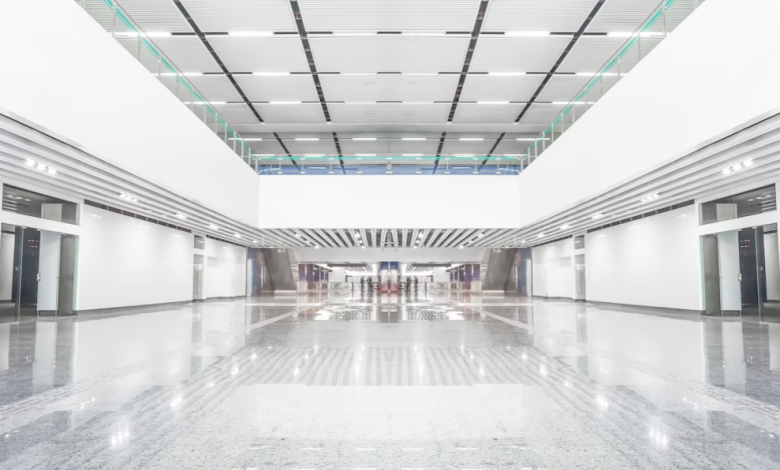The Benefits of Epoxy Flooring

Epoxy flooring is an attractive yet long-term floor coating option that will increase the value of both your home and business. Furthermore, it’s simple to maintain and resistant to stains – perfect for any environment!
Professional installation is essential to making sure that epoxy floors look their best and stand the test of time, including grinding the floor and acid-etching before coating it with epoxy resins.
Cost
If you want a durable and beautiful floor that will stand the test of time, epoxy flooring could be your answer. Not only is it cost-effective and offers many advantages for commercial and industrial spaces, it is also great way to ensure employee and customer safety. Available in a wide array of colors for easy application on concrete and other surfaces alike – any volatile organic compounds produced during application should dissipate once your floor has set up completely!
Before installing epoxy floors, it is crucial that the concrete substrate is in good condition. If this is not the case, resurfacing the surface may be required – which may be costly but is still much cheaper than starting over completely with new flooring installations. A self-leveling epoxy coating may be suitable for smoothing old, damaged concrete; these types of coatings are commonly found in industrial settings; they can also be applied residentially.
Epoxy flooring can be installed directly over existing materials, saving time and money while eliminating the need to remove existing ones. Installation time may also be shorter compared to other solutions; however, due to its unique installation requirements and potential challenges. Therefore, for best results it is wise to hire an experienced professional contractor with years of industry knowledge for best results.
Price for epoxy floors depends on your color and decorative options, such as metallic or glitter floors which tend to cost more than solid-colored options. Furthermore, labor costs vary between states – it could be charged per hour or per square foot.
Installing epoxy floors typically costs $5 per square foot; however, special effects like metallic notes and decorative flakes could increase this cost to $12 per square foot. A professional flooring contractor will be able to provide a detailed cost estimate tailored specifically for your project; be sure to get several quotes from various contractors so you can compare prices and quality, or ask friends and family for referrals.
Durability
Epoxy flooring is one of the toughest floor coatings on the market, designed to withstand heavy foot traffic while remaining chemical-proof and resist cracking or peeling. Perfect for both homes and commercial settings alike, however it should be remembered that epoxy floors should not be walked on when wet conditions exist.
Epoxies are composed of thermosetting resins mixed with polyamine hardeners to create epoxy coatings, then cross-linked for strength and density. The hardeners give epoxy its durability by bonding tenaciously to concrete surfaces – providing strong yet resilient flooring options suitable for most commercial and industrial settings.
Home garages typically don’t experience heavy foot traffic; as long as your family and furry friends are the only ones using your epoxy floor, it should last several years without showing signs of wear and tear. But for high traffic areas it’s essential that you inform trusted flooring contractors how much wear and tear the floor will experience, so they can select appropriate epoxy coatings accordingly.
Epoxy flooring is easy to maintain thanks to its durable surface and specially-formulated cleaning products, enabling sweeping and mopping with ease. However, abrasive cleaners or scrubbers should be avoided as this may damage its surface and result in discolored epoxy flooring.
If you choose a full color flake epoxy system, color flakes will be applied directly onto the wet base epoxy coating while still wet, creating custom combinations of colors that suit your space perfectly. Once dry, a topcoat is then applied to lock in and protect the color flakes while offering additional wear protection – with final coat typically consisting of clear sealant that offers optimal aesthetics and wear protection for your floor.
Epoxy floors may contain traction additives to reduce the risk of slips and falls, including polymer grit, mortar, aluminum oxide or even gravel and sand. These materials come in different varieties.
Aesthetics
Epoxy flooring can be designed to resemble various materials, creating a truly custom appearance in any garage, residential space, or commercial facility. Achieve this desired aesthetic can be accomplished through various means; using broadcast flake or various color pigments could do the trick, as can selecting smaller flakes over larger ones for more traditional style installations.
As another way to customize the appearance of your garage floor, adding decorative top coats is an effective way to personalize its appearance. There is a range of decorative options available from metallic rivers of color to 3-D moon-like craters. A clear coat applied over these decorative elements will protect them and help avoid scratching or damage over time.
Epoxy floors not only look appealing but are highly durable and easy to keep clean as well. Their resilience allows them to withstand heavy equipment, vehicle traffic and chemical spills without staining or warping; furthermore they feature an exceptionally high coefficient of friction making them suitable for environments where frequent movement takes place.
Epoxy floors stand out from other types of flooring because they do not contain crevices and edges that harbor dirt and bacteria, making them particularly useful in medical and laboratory facilities where cleanliness is of utmost importance. Furthermore, epoxy floors do not stain or warp due to water damage, making them an excellent option for areas with high moisture and humidity levels.
If you’re considering epoxy floor coating for either your home or business, be sure to reach out to a reputable company. They can assist with selecting materials and designs suitable for your space as well as providing estimates regarding costs, time frames and questions you might have about how the project will progress. Furthermore, most will offer free estimates before starting their projects – make sure you request one that includes services like cleanup and equipment removal from the area!
Maintenance
Epoxy floors are relatively straightforward to keep clean, though their frequency of cleaning depends on both environment and soilage levels. When working in dirty environments, regular floor maintenance should increase accordingly. Furthermore, plywood should be placed underneath equipment for welding in order to protect it from scratches which may damage its look or lead to costly repairs in later years.
Epoxy flooring may not be as porous as concrete, but it still absorbs spills and stains quickly. Wipe away all spills immediately to avoid staining of the surface. Acids, harsh solvents and caustics are particularly hard on epoxy floor coatings; any splashes should be quickly wiped up using a soft cloth or paper towel in order to avoid staining of this coating material.
Epoxy floor coatings have the potential to outlive 10-20 year lifespans with proper care and installation, yet quality installation remains key in their lifecycle. If a floor is improperly installed, extended company downtime may ensue while repairs or replacement is carried out, leading to lost revenue and productivity losses.
Industrial environments expose epoxy floor coatings to heavy foot traffic, chemical spills and other extreme conditions that require regular maintenance for safety and durability. Aesthetically pleasing floors also contribute to creating the right image of an organization and make an impressionful statement to customers about who the business is.
Maintaining an epoxy floor requires daily sweeping for optimal performance. Sweeping removes debris that abrasions the coating surface while simultaneously prolonging its lifespan. At the entrance of your garage or shop, placing a walk-off mat may also help capture dirt, sand and moisture that would otherwise get tracked onto the floor coating surface. Rubber pads placed beneath heavy machinery such as jacks or other heavy machinery to avoid scratching an epoxy floor are another simple measure that should be taken. Also, sandwich baggies should be put over garage infrared sensors in order to protect them from wetting out. Finally, regular mopping with hot water mixed with clear ammonia solution should also be employed when working in areas involving heavy equipment, machinery and continual foot traffic is advised.




